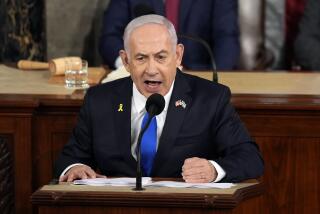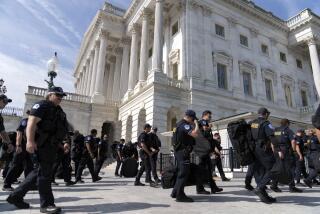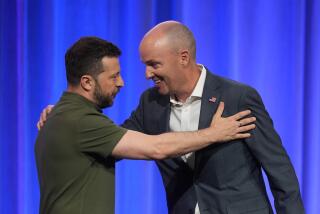Gorbachev Asks for Aid to Former Soviet Union : Democracy: Congress receives him warmly, but many believe that money would be better spent at home than in shoring up the new republics.
- Share via
WASHINGTON — Introduced as a “hero of world peace” by House Speaker Thomas S. Foley, former Soviet President Mikhail S. Gorbachev appealed to Congress on Thursday to approve economic aid to the former Soviet republics to prevent them from sinking back into totalitarianism.
Gorbachev’s speech in the historic statuary hall of the Capitol was received warmly, but Congress seems in no mood to give quick approval to the Bush Administration’s aid package because many lawmakers believe that the money could be better spent at home.
It was Gorbachev’s first appearance on Capitol Hill, coming almost five years after his 1987 summit meeting in Washington with then-President Ronald Reagan. On that occasion, the Soviet president passed up the opportunity to address a joint session of Congress because of concern that anti-communist lawmakers might stage an embarrassing walkout.
The Soviet empire has turned toward democracy since then. Even so, some congressmen remained unwilling to forget the Cold War. In remarks released after the speech, the House Republican Study Committee called Gorbachev the “failed Soviet dictator” and said he was the rightful heir to “a dismal record of oppression, Stalinist imperialism, unprecedented military buildup and struggle against true democracy.”
Rep. Philip M. Crane (R-Ill.), joined by 35 other lawmakers, sent Gorbachev a letter demanding to know the names of “the top spies in the KGB” and the nature of their actions against U.S. interests, the fate of U.S. prisoners of war from World War II, the Korean War and the Vietnam War “that were held in Soviet prisons” and “the true fate of Korean Airlines Flight 007,” which was shot down by Soviet jets in 1983.
Gorbachev’s visit came near the end of a two-week tour of the United States, devoted primarily to raising money for the Gorbachev Foundation, an organization intended to promote democracy and disarmament.
His speech was set not in the spacious House chamber but in the somewhat cramped confines of a hall used as a gallery for bigger-than-life statues of personalities from U.S. history selected by each of the 50 states.
Organizers said 300 chairs were set out, enough for more than half of the 535 senators and House members. But there were not nearly that many lawmakers present, so staff members filled many seats.
Washington can be a cruel town that has little time for out-of-office politicians. But Gorbachev, who lost the Soviet presidency in December, was treated to a flowery tag-team introduction by the top Democratic and Republican leadership of the Senate and House, with each trying to outdo the others in praising Gorbachev’s place in history.
Foley (D-Wash.) called Gorbachev “a great leader and a hero of world peace.” House Republican leader Robert H. Michel of Illinois said American office seekers envy Gorbachev’s political skills. And Senate Democratic leader George J. Mitchell of Maine intoned: “Rarely can it be said of an individual that he has profoundly changed the course of history. There can be no question that you are one who has done so.”
Gorbachev’s speech echoed many of the themes he has hit at earlier stops on his American tour, calling for American support for democratic reform in the former Soviet Union.
He called on Congress to “recall how much is riding on this vote” on the Administration’s aid package.
“This is a historic moment and a historic opportunity,” he said through an interpreter. “It should not be allowed to slip by.
“When Russia emerges from the present severe crisis, the national memory will forever remain cognizant of the magnanimity displayed by Americans at this moment of difficulty.”
But then he seemed to weaken his own pledge of gratitude by noting that the last time the United States provided significant aid was at the end of World War II. He conceded that Stalinism and the Cold War followed that display of American generosity but he promised, “This could never happen again.”
After the speech, Gorbachev had a private lunch with congressional leaders and a private dinner at the White House with President Bush.
More to Read
Get the L.A. Times Politics newsletter
Deeply reported insights into legislation, politics and policy from Sacramento, Washington and beyond. In your inbox twice per week.
You may occasionally receive promotional content from the Los Angeles Times.










